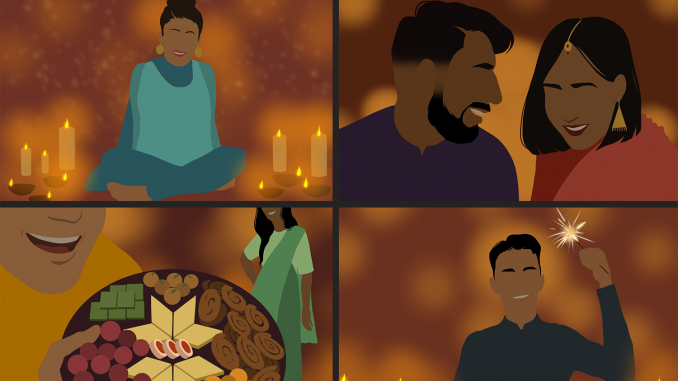
To Rohit Mittal, Diwali is like “the Christmas of India.”
“It is the time of the year when everyone comes together to enjoy and celebrate the festival of lights,” said Mittal, a junior mechanical engineering major and president of Kaafila, an Indian student organization at Temple University.
Temple students who celebrate Diwali adapted their celebrations as a result of the COVID-19 pandemic. Students are connecting with their extended family virtually this year as they strive to keep the tradition alive through 2020.
Diwali, celebrated throughout four to five days, is one of the largest holidays for Indians and is one of the holiest times of the year for several different religious groups, including Hindus, Sikhs and Jains, the Independent reported. This year Diwali started on Nov. 12 and the main festival is on Nov. 14.
Due to the COVID-19 pandemic, many of the traditional celebrations are not feasible due to the risk of spreading COVID-19 in large gatherings, USA Today reported.
“During the new year of our Hindu calendar, people visit each other’s homes and share sweets and well wishes to each other, but due to COVID-19 people will not likely visit each other homes and try to celebrate among the close family members itself,” said Dhruv Patel, a sophomore biology major and public relations manager for Kaafila.
Philadelphia recommended confining holiday events to one’s household and using video conferencing to connect with friends and extended family in a new set of guidelines released on Nov. 12.
Kaafila usually hosts a dance to celebrate the holiday, but this year, they are holding a rangoli contest on social media, Mittal said. For the contest, students will take a picture of their rangoli, which are colorful patterns drawn on the ground created with rice and multicolor sand, and tag Kaafila in their Instagram story, Mittal said.
Diya Patel won’t be able to be at home or visit her extended family for the holiday but is using technology to connect with them, she said.
“It’s a little upsetting that this year’s traditions have to play out a little differently, but I’d much rather sacrifice this one family gathering for the health and well-being of the people I care about,” said Patel, a sophomore health professions major
Rani Patel, a senior business management major, said she plans on decorating with her parents and hosting a prayer over Zoom with her extended family.
Normally, her family sets up fireworks and hosts a prayer using the small shrine in their home, Rani Patel said. The prayer, also known as a Puja, involves decorating the shrine, placing flowers in front of it and saying the prayers.
“When I think of Diwali, I think of me and my entire family getting together, decorating our houses with bright colors and enjoying our favorite foods and sweets,” Rani Patel said.
For Pratiti Mehta, a sophomore finance major, Diwali is a reminder of the goodness in the world and an opportunity to get together with her friends and family.
“I was excited to celebrate with the community I’ve found here,” Mehta said. “I was looking forward to all the events that each South Asian association would host.”


Be the first to comment